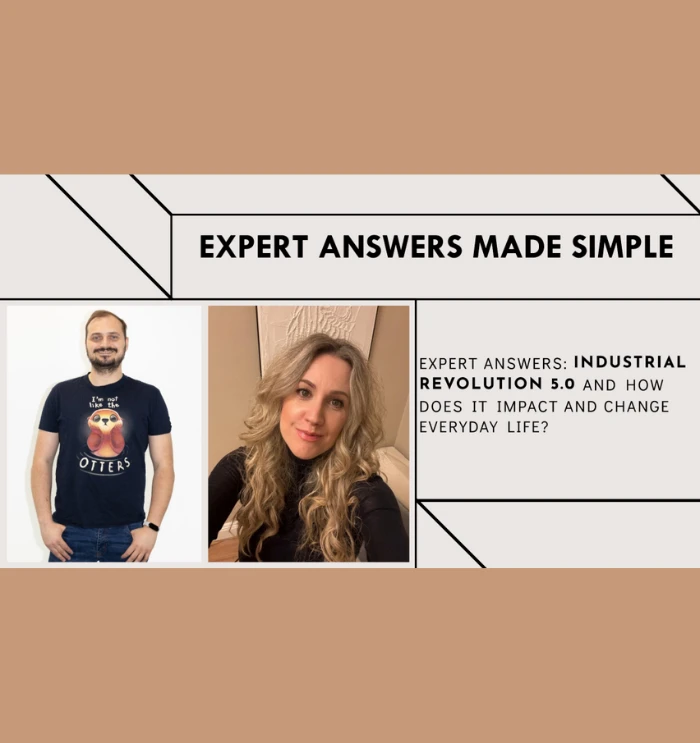Homepage » Episode 5#: Industrial Revolution 5.0.
“3 Questions to the Expert”-and 3 answers that explain complex phenomena in a simple way.
Are we aware that we have been living in the 5.0 Technological Revolution for some time now? What is it? What’s changing? What does it mean for us? And most importantly, how does it affect our lives? These questions were answered by the outstanding Tomasz Osmanowski during Episode 5# of “3 Questions to the Expert” – 3 answers that explain complex phenomena in a simple way, where Tomek explains “Industrial Revolution 5.0”. I strongly invite you to read.
Ania Modrzewska: What is Industrial Revolution 5.0 and how is it different from previous ones?
Tomek Osmanowski: Industrial Revolution 5.0 is a model that emphasizes a human-centered approach – integrating advanced technologies such as artificial intelligence, robotics, and IoT with societal needs, focusing on sustainability, personalization, and ethical considerations. Industry 5.0 aims to put people at the centre of innovation, while addressing environmental challenges such as climate change, social justice, healthcare, etc. The European Union emphasizes that Industry 5.0 is about creating technologies that serve rather than dominate humanity. During the first industrial revolution we saw the cruelty of unregulated innovation – the rich exploited the poor without precedent. Experienced workers were replaced by less experienced ones, working in harder conditions, longer hours, for lower wages. Overcoming the negative social effects generated by the sudden introduction of disruptive innovations took almost a century. Each industrial revolution changed the socio-economic landscape to some extent, followed by new policies or whole ideologies introduced by legislators or social revolutionaries – for good or ill – we can assume that communism is a legacy of the first industrial revolution… Hopefully, Industrial Revolution 5.0 is one step ahead of change and we can see this at least in the EU. A recent example is the EU AI ACT, which regulates the adoption of artificial intelligence based on socio-political risk. Revenue is not always important, which – by the way – is difficult to understand by US Big Tech, already omitting EU region with the introduction of their AI solutions (why? what they are up to in the long term?).
Ania Modrzewska: How does the 5.0 revolution impact and change everyday life?
Tomek Osmanowski: Industry 5.0 fosters personalized solutions and service innovations. For example, Żabka’s ‘Kawonament’ represents an innovative digital subscription model providing access to coffee within subscribed limits. This is in line with Industry 5.0 principles by using customer data to offer personalized services while improving operational efficiency. This reflects the integration of processes, data, and people:
Processes: Streamlining the sales process and integrating digital solutions (such as the dedicated Zappka mobile app) into everyday retail sales.
Data: Leveraging consumer preferences to tailor offers. Utilizing Żabka’s extensive store network and high annual coffee sales.
People: Focusing on customer satisfaction (lower price, simplified ordering) and employee engagement through the automation of non-core activities. This simultaneously increases the organization’s overall sales volume (I found this information online).
Ania Modrzewska: What trends can we expect in the future and how will they affect the average person?
Tomek Osmanowski: Who knows? All I can say is that it really depends on the global eco-political situation. From my point of view – a regular guy living in Poland – in terms of revolutionary scientific and technological breakthroughs, to put it colloquially, we haven’t done shit in recent years. The last thing I remember was the ‘WOW effect’ caused by chat GPT, two years ago. How many life-changing, AI-based products have we already seen? In terms of AI, What we can expect for sure are attempts to create working AI agents – AI chatbots with the ability to perform operations, such as Amelia, which is being developed by Fujitsu. Bank users already have many encounters with chatbots, so the next step will be to enhance them with the ability to perform operations such as locking an account, changing passwords, etc. AI agents can find wide applications in society. In the big picture, I believe we already know the directions we are going to – they are clearly defined by our legislators, such as the European Parliament. In the field of science and technology, there is currently nothing new to surprise us. We already have a lot going on in the current directions (sustainability, environment, healthcare, social law) and the current digital technologies (IoT, AI, Power BI, Blockchain) do not mention materials such as graphene, which are still waiting to be properly introduced. In this decade, I do not expect anything extraordinary, any profound change to our lifestyle. With a little luck, we will just get better as a global society ( while is hard to forget that we have a few nasty conflicts to solve in the coming years ).
